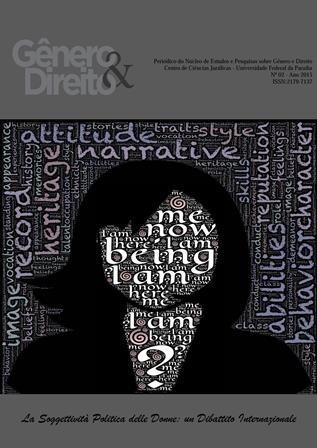INTERCULTURAL FEMINIST PRACTICES IN ITALY: CHALLENGING STEREOTYPED AND OTHERING IMAGES OF MIGRANT WOMEN
Resumo
Feminist postcolonial authors criticised the tendency of mainstream western feminism to represent 'third world' women as necessarily less emancipated than western women and to describe their cultural practices in an othering way, without holding their own culture up to the same scrutiny. From this idea stems a paternalistic and patronising attitude that locates western women in a “position to liberate their less fortunate sisters, especially those in the 'Third World'”. (hooks, 2000: 45). In light of these reflections, this article investigates to what extent selected women’s intercultural associations in Italy have been able to counter dominant discourses that see migrant women as necessarily needy and deprived or as a sign of cultural difference. The research confronts the associations' mission statements with the practices and relationships that emerged from the interviews. It focuses first on power sharing within the associations and the relevance of patronizing attitudes on the part of Italian-born women. Secondly the article explores how associations addressed the notion of cultural difference by focusing on the specific issues of Islamic veiling practices and female genital mutilations. Finally it investigates the possible value of cross-cultural comparisons on practices detrimental to women in the promotion of intercultural feminist practices.Downloads
Referências
Ahmed, Sara. (2000). Strange Encounters. Embodied Others in Post-Coloniality. London: Routledge.
Ang, Ien (1995). “I’m a Feminist but... “Other” Women and Postnational Feminism.” In Caine, Barbara & Pringle, Rosemary (Eds.), Transitions: New Australian Feminism. London: Allen and Unwin, 57-73.
Anthias, Floya (2002). “Beyond Feminism and Multiculturalism: Locating Difference and the Politics of Location.”, Women's Studies International Forum, 25 (3), 275-286.
Anthias, Floya, Cederberg, Maja, Barber, Tamsin, & Ayres, Ron (2013). Welfare Regimes, Markets and Policies: The Experience of Migrant Women. In Anthias, Floya, Kontos, Maria, Morokvasic-Müller, Mirjana (Eds.), Paradoxes of integration: Female Migrants in Europe. New York: Springer, 37-58.
Bernacchi, Erika (2014). Exploring Intercultural Feminist Practices in Italy - From Global Sisterhood to Reflexive Solidarity? Ph.D thesis, University College of Dublin.
Brah, Avtar (1996). Cartographies of Diaspora. Contesting Identities. London: Routledge.
Campani, Giovanna & Chiappelli Tiziana (2014), Migrant Women and Gender Gap in Southern Europe: the Italian Case. In Anthias, Floya and Pajnik, Mojca (Eds.) Contesting Integration, Engendering Migration. Theory and Practice. London: Palgrave MacMillan.
Fanon, Frantz (1965). Studies in a Dying Colonialism. New York: Monthly Review Press.
Frankenberg, Ruth (1993a). “Growing up White: Feminism, Racism and the Social Geography of Childhood”, Feminist Review, 45, 51-84.
Frankenberg, Ruth (1993b). White Women, Race Matters. The Social Construction of Whiteness. Minneapolis: University of Minnesota Press.
Honig, Bonnie (1999). “My Culture Made Me Do it”. In Cohen, Joshua, Howard, Matthew and Nussbaum, Martha (Eds.), Is Multiculturalism Bad For Women? / Susan Moller Okin With Respondents. New York: Princetown University Press, 35-40.
hooks, bell (2000). Feminism Is For Everybody: Passionate Politics. Cambridge, MA: South End Press.
Lewis, Reina (2004). Rethinking Orientalism: Women, Travel, and the Ottoman Harem. New Brunswick, NJ: Rutgers University Press.
King, Russell (2001). The Mediterranean Passage: Migration and New Cultural Encounters in Southern Europe. Liverpool: Liverpool University Press.
McIntosh, Peggy (1988). “White Privilege and Male Privilege: A Personal Account of Coming To See Correspondences through Work in Women’s Studies.” Working Paper 189.
McIntosh, Peggy (1990). “White Privilege: Unpacking the Invisible Knapsack.” Independent School, Winter90. 49 (2), 31-35.
Mernissi, Fatima (2001). Scheherazade Goes West: Different Cultures, Different Harems. Washington: Washington Square Press.
Mohanty, Chandra Talpade (1984). “Under Western Eyes: Feminist Scholarship and Colonial Discourses.”, Boundary 2, 12(3), 333-358.
Mohanty, Chandra Talpade (2003). Feminism Without Borders: Decolonizing Theory, Practicing Solidarity. Durham: Duke University Press.
Phillips, Anne (2007). Multiculturalism Without Culture. Princeton: Princeton University Press.
Pojmann, Wendy (2006). Immigrant Women and Feminism in Italy. Aldershot: Ashgate.
Rich, Adrienne (1979). On Lies, Secrets and Silence. New York: Norton.
Spivak, Gayatri Chakravorty (1993). “Can the Subaltern speak?” In Williams, Patrick & Chrisman, Laura (Eds.), Colonial Discourse and Post-Colonial Theory: a Reader. Hemel Hempstead: Harvester Wheatsheaf, 66-112
Yeğenoğlu, Meyda (1998). Colonial Fantasies: Towards a Feminist Reading of Orientalism. Cambridge: Cambridge University Press.
Yuval Davis, Nira (1997). Gender and Nation. London: Sage Publications.
Yuval Davis, Nira (2006). “Human/Women’s Rights and Feminist Transversal Politics”. In Ferree, Myra Marx & Tripp, Aili Mari (Eds.), Global Feminism: Transnational Women's Activism, Organizing, and Human Rights. New York: New York University Press, 275-291.

